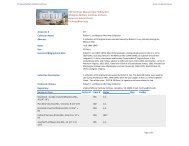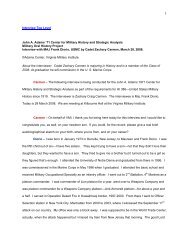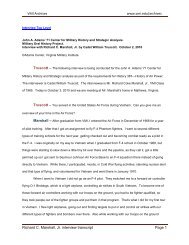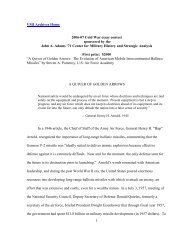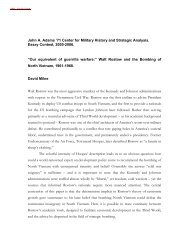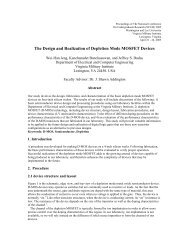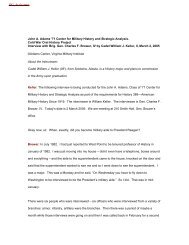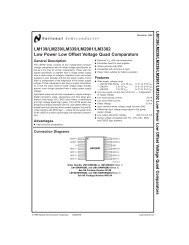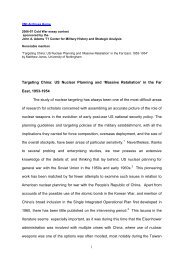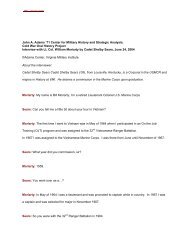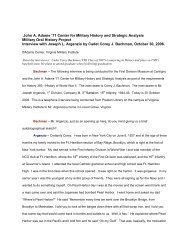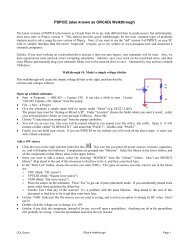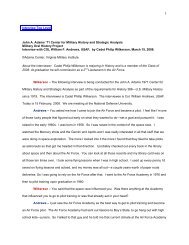Academic Catalog - Virginia Military Institute Admissions
Academic Catalog - Virginia Military Institute Admissions
Academic Catalog - Virginia Military Institute Admissions
Create successful ePaper yourself
Turn your PDF publications into a flip-book with our unique Google optimized e-Paper software.
<strong>Virginia</strong> <strong>Military</strong> <strong>Institute</strong><br />
12-13 <strong>Catalog</strong>ue<br />
HI 373. COLONIAL LATIN AMERICA 3—0—3<br />
A survey of historical developments from the Iberian Reconquest through the Wars of<br />
Independence in Latin America. Region: Africa/Asia/Latin America. Methodologically Intensive.<br />
May also be offered as Writing Intensive.<br />
HI 374. MODERN LATIN AMERICA 3—0—3<br />
A continuation of HI 373 comprising a survey of historical developments in Latin America in<br />
general and certain Latin American Republics from the Wars of Independence to the present.<br />
Region: Africa/Asia/Latin America. Methodologically Intensive. May also be offered as Writing Intensive.<br />
HI 375. GERMANY AND EASTERN EUROPE FROM BISMARCK TO BRANDT 3—0—3<br />
Special attention will be given to the nature of the Bismarckian Empire, Germany’s role in<br />
the origins of World War I, the Weimar Republic, Nazi totalitarianism, and post-war German<br />
society. Region: Europe.<br />
HI 377. INSURGENCY AND TERRORISM 3—0—3<br />
An introduction to the modern history of armed struggle for revolutionary aims and the<br />
counterinsurgency campaigns that ensue. In addition to studying the major theorists of<br />
insurgency and counterinsurgency, the class will examine specific studies from the late<br />
eighteenth century through contemporary conflicts in the Middle East. Methodologically<br />
intensive. Region: Europe or Asia/Africa/Latin America, but not both.<br />
HI 378. EUROPEAN WARFARE, 1600-1871 3—0—3<br />
A survey of the development of modern warfare in Europe from the “<strong>Military</strong> Revolution”<br />
of the seventeenth century through the Franco-Prussian War. In addition to studying the<br />
armed forces, important battles, campaigns and wars, the class will explore related social,<br />
political, diplomatic, and cultural developments. Key themes will include eighteenth-century<br />
limited warfare, French Revolutionary and Napoleonic warfare, the Wars of Italian and German<br />
Unification, and military thought and strategy. Region: Europe.<br />
HI 379. EUROPEAN WARFARE SINCE 1871 3—0—3<br />
This course introduces students to major aspects of European warfare from the unification<br />
of Germany in 1871 through the Cold War. Key themes include the evolution of military<br />
thought and the operational, political, socio-cultural, and technological aspects of armed<br />
forces and war. Region: Europe.<br />
HI 380. EUROPE IN RENAISSANCE AND REFORMATION 3—0—3<br />
A study of European politics and culture (1400-1648) with an emphasis on the literary and<br />
artistic legacy of the Renaissance and on the religious struggles of the Reformation era.<br />
Region: Europe. Methodologically Intensive.<br />
HI 382. MODERN RUSSIAN HISTORY 3—0—3<br />
A survey of the history of Russia, stressing economic, political, social, and intellectual<br />
development during the Empire and the Soviet Union. Region: Europe.<br />
HI 383. VIRGINIA HISTORY I 3—0—3<br />
A survey of the political, social, economic, and cultural history of <strong>Virginia</strong> from 1607 to<br />
1865. Region: United States.<br />
HI 384. VIRGINIA HISTORY II 3—0—3<br />
A survey of the political, social, economic, and cultural history of <strong>Virginia</strong> from 1865 to the<br />
present. Region: United States.<br />
HI 385. U.S. MILITARY HISTORY TO 1919 3—0—3<br />
A survey of American military history through World War I with emphasis on strategy,<br />
force structure, technology, and the record of the American armed forces in both war and<br />
peace. Region: United States.<br />
HI 386. U.S. MILITARY HISTORY SINCE 1919 3—0—3<br />
A survey of American military history since World War I with emphasis on strategy, force<br />
structure, technology, and the record of the American armed forces in both war and peace.<br />
Region: United States.<br />
HI 387. HISTORY OF AIR POWER 3—0—3<br />
An investigation into the development and employment of military aviation in both peace<br />
and war. Common threads to be followed include leadership, strategy, tactics, technology,<br />
joint operations, and ethical issues. Region: Europe or the United States (but not both).<br />
HI 388. MODERN SPAIN: CIVIL WAR AND COLONIAL CONFLICT 3—0—3<br />
This course introduces students to modern Spanish history, paying particular attention<br />
to military affairs. Major themes include the guerrilla struggles against Napoleon,<br />
counterinsurgency in Cuba and Morocco, the Spanish Civil War, the dictatorship of<br />
Francisco Franco, and ongoing issues of regional nationalism and terrorism. Region: Europe.<br />
Methodologically intensive.<br />
HI 390. SEA POWER FROM THE AGE OF SAIL TO THE EARLY TWENTIETH CENTURY 3—0—3<br />
A survey that deals with the use of naval power in both war and peace from the sixteenth<br />
century to the early twentieth century. Dominant themes will include the evolution of<br />
strategy and tactics in war, the impact of technology on tactics and shipboard lives, and the<br />
overall importance of sea power to the foreign policies of naval powers. Coverage includes<br />
discussions that focus on the Seven Years War, the American Revolutionary War, the French<br />
Revolutionary and Napoleonic Wars, the War of 1812, the Crimean War, the American Civil<br />
War, the Sino-Japanese War, and the Russo-Japanese War. Region: Europe.<br />
HI 391. SEA POWER IN THE 20th CENTURY 3—0—3<br />
This course investigates the employment of naval power in both peace and war during<br />
the twentieth century. Among the common threads to be followed are leadership, strategy,<br />
tactics, technology, and joint operations. The navies of Great Britain, Germany, Imperial<br />
Japan, the Soviet Union, and the United States will receive the closest scrutiny. Substantial<br />
class time will be devoted to both world wars, Korea, and Vietnam. Region: Europe or the<br />
United States (but not both).<br />
HI 392 WORLD WAR I 3—0—3<br />
A survey of the events leading to World War I and the course of the conflict itself. The<br />
coverage will include detail on the grand strategy and actions of the principal combatants,<br />
tactics, operations, armaments, and logistics. The course will focus on the principal<br />
combatants, but will offer worldwide coverage to showcase the magnitude of the war and<br />
the importance of regional conflicts on the course of the war. It will also include the effect<br />
of World War I, as a total war, on civilians and the world as a whole following the conclusion<br />
of peace. Through this coverage, the student will gain an understanding not only of war in<br />
the early twentieth century, but also an understanding of the legacy of the war on global<br />
development. Region: Europe or the United States, but not both.<br />
HI 393. WORLD WAR II 3—0—3<br />
This course aims to give students a broad overview of World War II, with a deeper knowledge<br />
of certain key themes. Areas of particular emphasis include military thought, “Blitzkrieg” and<br />
“Operational Art,” the Battle of France, the Eastern Front campaigns, and the realities of<br />
warfare in the Pacific. The class also covers such topics as Nazi ideology and the Holocaust.<br />
Region: Europe or the United States or Africa/Asia/Latin America (can fulfill one category only).<br />
HI 400. HISTORY INTERNSHIP 0—0—1 to 6<br />
Under appropriate conditions, cadets may earn up to six hours of academic credit in History<br />
for research and other academic activities related to an internship sponsored and approved<br />
by the History Department. Internships will normally be conducted during the summer and<br />
will involve activities away from the <strong>Institute</strong>. Details of activities and the amount of credit to<br />
be awarded must be arranged prior to the commencement of the internship and approved<br />
by the head of the History Department.<br />
HI 460W. CAPSTONE EXPERIENCE 3—0—3<br />
Senior level methodologically intensive research seminar leading to the production of a<br />
major research paper. Topics vary. Prerequisite: completion of a 300-level methodologically<br />
intensive course, and perhaps other prerequisites at the discretion of the instructor. Required<br />
of history majors except those who complete the departmental honors sequence. Note Well:<br />
HI 460W cannot be used to satisfy a regional distribution requirement. Writing Intensive (W).<br />
HI 480. DIRECTED STUDY 3—0—3<br />
Advanced level one-on-one course emphasizing historical methodology and leading<br />
to the production of a major research paper. Pre-requisite: a 300-level methodologicallyintensive<br />
course and possibly other courses as required by the instructor; permission of the<br />
department head, completion of twelve hours of history courses numbered 200 or higher<br />
taken in residence at VMI, and at least a 3.0 GPA in history courses taken at VMI. May also<br />
be taken as a writing-intensive course (480W) with instructor’s permission.<br />
HI 481-490, and 493 to 499. SPECIAL SEMINAR 3—0—3<br />
Seminars on special topics in history as suggested from time to time by members of<br />
the faculty or groups of history majors. Course will require completion of a major student<br />
research paper.<br />
HI 491W. THESIS COURSE FOR HONORS (I) 3—0—3<br />
Preliminary work on a research paper based on the reading done in HI 372. Prerequisite: HI<br />
372. Course concludes with an oral defense of a draft version of the thesis. Writing intensive (W).<br />
HI 492W. THESIS COURSE FOR HONORS (II) 3—0—3<br />
Embraces the completion of the research paper begun in HI 491. Prerequisite: HI 491.<br />
Writing intensive (W).<br />
HONORS PROGRAM<br />
COORDINATOR: ColONEl ROBERT MCDONALD<br />
For information pertaining to the <strong>Institute</strong> Honors Program, please see page 16.<br />
HN 100. HONORS FORUM 1—0—0<br />
The forum provides an occasion for students enrolled in the <strong>Institute</strong> Honors Program to<br />
meet weekly to discuss and debate issues of current national and international interest.<br />
Requirements include regular readings in major national newspapers and serious periodicals<br />
(e.g., The Economist, The Atlantic). Enrollment is restricted to cadets who have been admitted<br />
to the <strong>Institute</strong> Honors Program.<br />
HNL . HONORS SEMINAR - LIBERAL ARTS/LEADERSHIP 3—0—3<br />
These seminars provide exposure to topics in the liberal arts or leadership. One course in<br />
this sequence is required to earn <strong>Institute</strong> Honors. HNL seminars are writing intensive and<br />
are open to all majors. Topics vary by semester. Recent offerings include Shakespeare’s<br />
Leaders and Grand Strategy in the Twentieth Century. Prerequisite: Admission to the <strong>Institute</strong><br />
Honors Program.<br />
95




